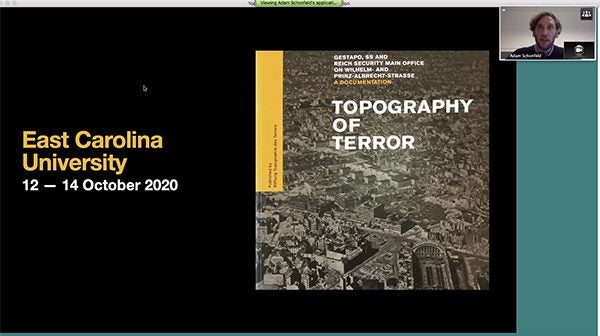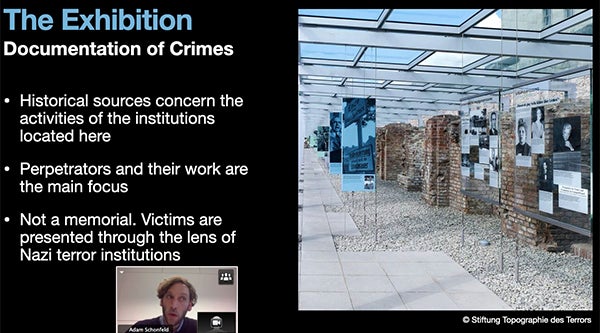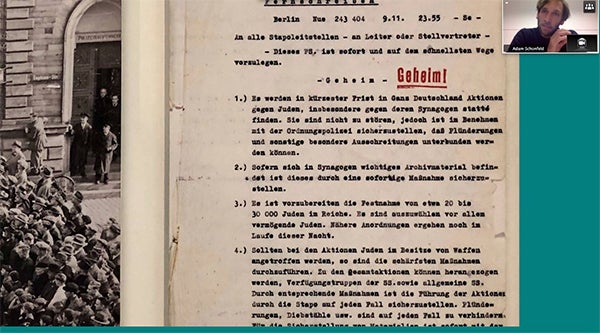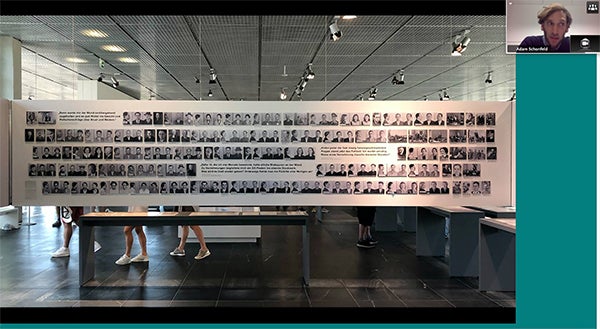TOPOGRAPHY OF TERROR
ECU students tour archives in Berlin through virtual Holocaust seminar
While study abroad trips are being postponed across the globe due to the coronavirus, East Carolina University professors are opening a world of possibilities for students through online courses and virtual events.

Historian Adam Schonfeld led the virtual seminar for 80 of Dr. Susanne Jones’ students.
Dr. Susanne Jones, associate professor of German in the Department of Foreign Languages and Literatures, provided students in her fall Holocaust class the opportunity to attend a virtual seminar led by Adam Schonfeld, a docent from the Berlin Holocaust Documentation Center Topography of Terror located in Germany.
Jones said this was a unique prospect for students, who typically only get a chance to work directly with a historian, view authentic Holocaust documents and learn their meaning through her summer study abroad program.
“Typically, only those few students who come to Berlin with me each year get a chance to go to the Topography of Terror,” Jones said. “Offering this class online has given us an opportunity to make this experience available to about 80 students, many of whom may never travel outside of the country.”
Prior to taking Jones’ course, students often learn about the Holocaust through survivor stories and films, but according to Jones, students sometimes do not understand how the Holocaust was allowed to occur or how it got to that point.
In Jones’ course, students study early legislation that defined, criminalized and persecuted Jews and other victim groups. They explore how, in just a few months, Nazi Germany went from a failed democracy to a regime of terror.
During the recent online seminar, students participated in a 2 1/2-hour discussion with Schonfeld. They learned about the Holocaust perpetrators: Who were they? What socioeconomic and educational backgrounds did the Nazi leaders and members of the SS — the Nazi party’s special police — come from? What motivated them to participate in the terror perpetrated by the regime?

An outdoor exhibition, “Berlin 1933–1945: Between Propaganda and Terror,” showcases national socialist policy in Berlin and its consequences for the city and its population.

A copy of the telex of Nov. 9, 1938, from the secret state police office in Berlin concerning the implementation of the pogroms of the Night of the Broken Glass.
Then, students virtually toured the Topography of Terror and analyzed archival images and documents housed at the site, which once served as SS headquarters.
“They were able to study the criminal files of regime opponents, which demonstrate the extreme acceleration and radicalization of terror in Nazi Germany,” Jones said.
“I really enjoyed looking at the historical documents and learning how to analyze them. It was so fascinating,” said freshman psychology major Kinsey Boston. “I think it was very nice of the museum to give us access to some of their documents.”
Senior music major Jacob McCain shared that one of the highlights for him was “looking over the police reports and comparing the radicalism between 1933 and 1943 and how the Nazi hold became vastly more extreme as time progressed.”

The ground floor exhibit in the Topography of Terror showcases a selection of political prisoners interrogated at Gestapo central headquarters beginning in 1933.
Jones said she was very pleased with the seminar and how students connected with the archival materials.
“They came away with new insights into the ways in which the Nazi leadership managed to force, coerce or lure Germans into the different roles of perpetrators, bystanders and victims as Germany transitioned to a new routine of Nazi terror,” she said. “The students’ feedback was so positive, in fact, that I am considering offering another such program with the German Resistance Memorial Center in Berlin.”
“I really enjoyed that we got to communicate with somebody that was in Germany,” said freshman criminal justice major Megan Clennan. “I thought it was very interesting and would recommend it for other classes.”
Nursing student Hailee Reber said the opportunity taught her so much.
“It really opened my eyes and showed me all the little steps Hitler took to create such a tragic event,” she said. “I got to learn about the people who resisted and what they did to counteract Hitler’s plan.”
